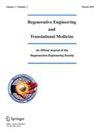Non-Invasive Imaging Modalities for Stem Cells Tracking in Osteoarthritis
IF 1.9
Q3 ENGINEERING, BIOMEDICAL
Regenerative Engineering and Translational Medicine
Pub Date : 2022-01-17
DOI:10.21203/rs.3.rs-1237230/v1
引用次数: 0
Abstract
The administration of stem cells in regenerative medicine has emerged as a potential treatment option for many diseases. The privation of an impressive cure for joint pathologies such as knee osteoarthritis (OA) has increased concern in stem cell (SC)-based therapies. Many questions remain about the survival and biology of SC after transplantation. Current progression in molecular biology and imaging has accredited winsome non-invasive SC monitoring in living subjects. Over time, these methods have been updated to assess the viability and biology of SC transplantation. The use of nanoparticles has become important in many aspects of SCs tracking. Given that different tracking strategies are being used for clinical trials, it is important to choose the best one. In this review, various imaging methods, which were assimilated to monitor the viability and biology of SC after injection in osteoarthritis, were discussed.骨关节炎干细胞追踪的非侵入性成像方式
干细胞在再生医学中的应用已经成为许多疾病的潜在治疗选择。缺乏令人印象深刻的治疗关节疾病,如膝骨关节炎(OA),增加了对干细胞(SC)为基础的治疗的关注。干细胞移植后的存活和生物学仍有许多问题。目前分子生物学和影像学的进展已经认可了活体无创SC监测的可行性。随着时间的推移,这些方法已经更新,以评估SC移植的生存能力和生物学。纳米颗粒的使用在纳米颗粒跟踪的许多方面都变得非常重要。鉴于临床试验使用了不同的跟踪策略,选择最好的跟踪策略是很重要的。本文综述了用于监测骨关节炎注射后SC活力和生物学的各种成像方法。
本文章由计算机程序翻译,如有差异,请以英文原文为准。
求助全文
约1分钟内获得全文
求助全文
来源期刊

Regenerative Engineering and Translational Medicine
ENGINEERING, BIOMEDICAL-
CiteScore
4.90
自引率
11.50%
发文量
41
期刊介绍:
Regenerative Engineering is an international journal covering convergence of the disciplines of tissue engineering, advanced materials science, stem cell research, the physical sciences, and areas of developmental biology. This convergence brings exciting opportunities to translate bench-top research into bedside methods, allowing the possibility of moving beyond maintaining or repairing tissues to regenerating them. The journal encourages both top-down engineering approaches and bottom-up strategies integrating materials science with stem cell research and developmental biology. Convergence papers on instructive biomaterials, stimuli-responsive biomaterials, micro- and nano-patterning for regenerative engineering, elastomeric biomaterials, hydrogels for tissue engineering, and rapid prototyping and bioprinting approaches are particularly welcome.
The journal provides a premier, single-blind peer-reviewed forum for the publication of original papers, authoritative reviews, rapid communications, news and views, and opinion papers addressing the most important issues and efforts toward successfully regenerating complex human tissues and organs. All research articles feature a lay abstract highlighting the relevance and future impact for patients, government and other health officials, and members of the general public. Bridging the gap between the lab and the clinic, the journal also serves as a dedicated platform for showcasing translational research that brings basic scientific research and discoveries into clinical methods and therapies, contributing to the improvement of human health care.
Topics covered in Regenerative Engineering and Translational Medicine include:
Advanced materials science for regenerative and biomedical applicationsStem cells for tissue regenerationDrug delivery for tissue regenerationNanomaterials and nanobiotechnology for tissue regenerationStudies combining tissue engineering/regeneration with developmental biologyConvergence research in pre-clinical and clinical phases
 求助内容:
求助内容: 应助结果提醒方式:
应助结果提醒方式:


